Croatian Hypercar Rimac Nevera at Sun Gardens Resort for Potential Buyers
June 3, 2021 – Croatian automotive sensation Rimac Nevera has made its way down to Dubrovnik where it awaits potential buyers.
Rimac Automobili is a Croatian wonder. This boutique car manufacturer makes some of the fastest and most advanced electric hypercars in the world. After the great success of its Concept One, the new production car is Nevera. Nevera is a term on the Croatian coast describing a storm over the sea which can come out of nowhere and end up being deadly. What an apt name for the strongest production car in the world, measuring 1914 BHP.
We reported on the details of Rimac Nevera. The mastermind behind the company Mate Rimac is very happy with the end result. He stated the car's components are completely custom designed just for this model. With an impressive 0-100km/h achieved in 1,85 seconds, it is clear Rimac has created another head-turning masterpiece.
What's Next?
The latest news coming out of Dubrovacki Dnevnik is that Rimac Nevera is already in Dubrovnik. More precisely, it is at Sun Gardens Resort, just outside of Dubrovnik. Here, the potential buyers will enjoy the first look at the finished product. The resort, which already has a few car-related events of the highest order under its belt, will be a wonderful setting for the official sales event. With the price tag of 2 million, Rimac Nevera is not a car that many will buy. In fact, only around 150 units of these cars are going into production, as it stands now.
With Nevera's being officially revealed only days ago, we are expecting a surge of news, articles, and media hype over this unique car of unparalleled characteristics. Perhaps it is time to follow up the success of Rimac Automobili with other Croatian companies focusing on alternative power sources. It just might be the niche this country's economy is so desperately searching for.
For more, follow Made in Croatia.
Croatia's Coronavirus Update: 280 New Cases, 14 Deaths, 312 Recoveries
ZAGREB, 3 June 2021 - Over the past 24 hours, Croatia has registered 280 new cases of the coronavirus infection and there have been 14 related deaths, the national COVID-19 crisis management team said on Thursday.
The number of active cases today stands at 1,945. There are 653 patients in hospitals, 66 of whom are on ventilators.
Since 25 February 2020, when the first case of the infection was registered in Croatia, a total of 357,109 people have been registered as having contracted the novel coronavirus, 8,056 of them have died, and 347,108 have recovered, including 312 in the last 24 hours.
There are currently 9,603 people in self-isolation.
To date, 2,032,200 people have been tested, including 6,049 over the past 24 hours.
As of 2 June, 1,847,314 vaccine doses have been used, with 1,312,272 people receiving at least one dose, including 535,042 people who have received both doses.
For all, you need to know about coronavirus specific to Croatia, including travel, border, and quarantine rules, as well as the locations of vaccination points and testing centres across the country, make sure to bookmark our dedicated COVID-19 section and select your preferred language.
HUT COVID-19 Map Now Shows Epidemiological Situation by Counties and Islands
June 3, 2021 - The HUT COVID-19 map now shows the epidemiological situation by counties and islands!
While we are still waiting for Croatia to be displayed on the Re-open.eu website, by counties, and not in two regions, the Croatian Tourism Association (HUT) has changed its epidemiological map of Croatia, which daily shows the situation in counties and larger islands - croatiacovid19.info, reports. HRTurizam.
The map is updated with new data every day. It shows all the key standardized indicators of the epidemiological situation in the country - the daily number of new cases, the incidence per 100,000 inhabitants in the last 14 and the last 7 days, the number of active cases, and the share of positives in the last seven days. In addition, key measures related to restaurants, working hours, and other important measures for tourists are presented, both at the national level and at the level of individual counties. All these data are updated daily for each county, and the epidemiological situation is monitored separately on the larger islands.
Following the epidemiological situation, counties and islands are assigned colors defined by the criteria of the European Center for Disease Prevention - ECDC. According to these criteria, the "green" is currently Istria County and 5 Croatian islands - Brac, Cres, Korcula, Losinj, and Vis, which have less than 25 new cases per 100,000 inhabitants in the last 14 days.
“Regional presentation of the epidemiological situation in Croatia is crucial for the correct communication of the epidemiological situation in the tourist season towards our major markets. Germany has continuously supported the regional approach to the counties in Croatia since last season. Now it has been accepted by Austria, which is extremely important for this season's success. We believe that this is the best way to motivate the local population to behave responsibly, especially in tourist counties where safety is a prerequisite for tourist traffic. I thank you for your support in preparing this map and providing all the necessary information to the National Civil Protection Headquarters, the Ministry of the Interior, the Croatian Institute of Public Health, and the Croatian Institute for Health Insurance," said Veljko Ostojic, director of the Croatian Tourism Association.
The epidemiological map will be regularly communicated through all official channels of the Croatian Tourism Association and the channels of the largest tourist companies, members of HUT. Last season, the epidemiological map of HUT was reviewed by 750,000 visitors, of which 55 percent from Germany and then from Austria and Slovenia, and gave much crucial information that prompted them to travel to Croatia.
You can see more HERE.
For all, you need to know about coronavirus specific to Croatia, including travel, border, and quarantine rules, as well as the locations of vaccination points and testing centres across the country, make sure to bookmark our dedicated COVID-19 section and select your preferred language.
A New Record: More than 200,000 Split Public Bicycle Rentals!
June 3, 2021 - Split public bicycle rentals have reached over 200,000 - and this season, even more rental records will be broken!
It is already known that Split locals have fully accepted the public bicycle system, and by all accounts, we are facing another season in which rental records will be broken. This is according to data released before World Bicycle Day, which is celebrated on June 3. The total number of rentals since the beginning of the system in Split has reached 204,107, and the number of registered users has exceeded 20,000, Dalmatinski Portal writes.
Since the expansion of the system, the number of rentals has constantly been growing, and in May alone, a total of 36,540 rentals were realized, which is a significant increase compared to April when there were 25,000. If we look at the ratio in the first five months of last year and this year, there has been an increase in rentals over four times. On May 27, as many as 1,521 rentals were realized, which is the largest recorded figure in one day so far.
Last month was also a record year in terms of the number of newly registered users, of which there were 1,823. The majority of riders are still domestic (80%), but there is still a slight increase in the share of foreign riders. Precisely because of the constant growth of cyclists on the streets, which is expected with the arrival of better weather and the season, Split Parking has published an online version of cycling etiquette so that all cyclists can meet or be reminded of current traffic rules and you can read it on their website.
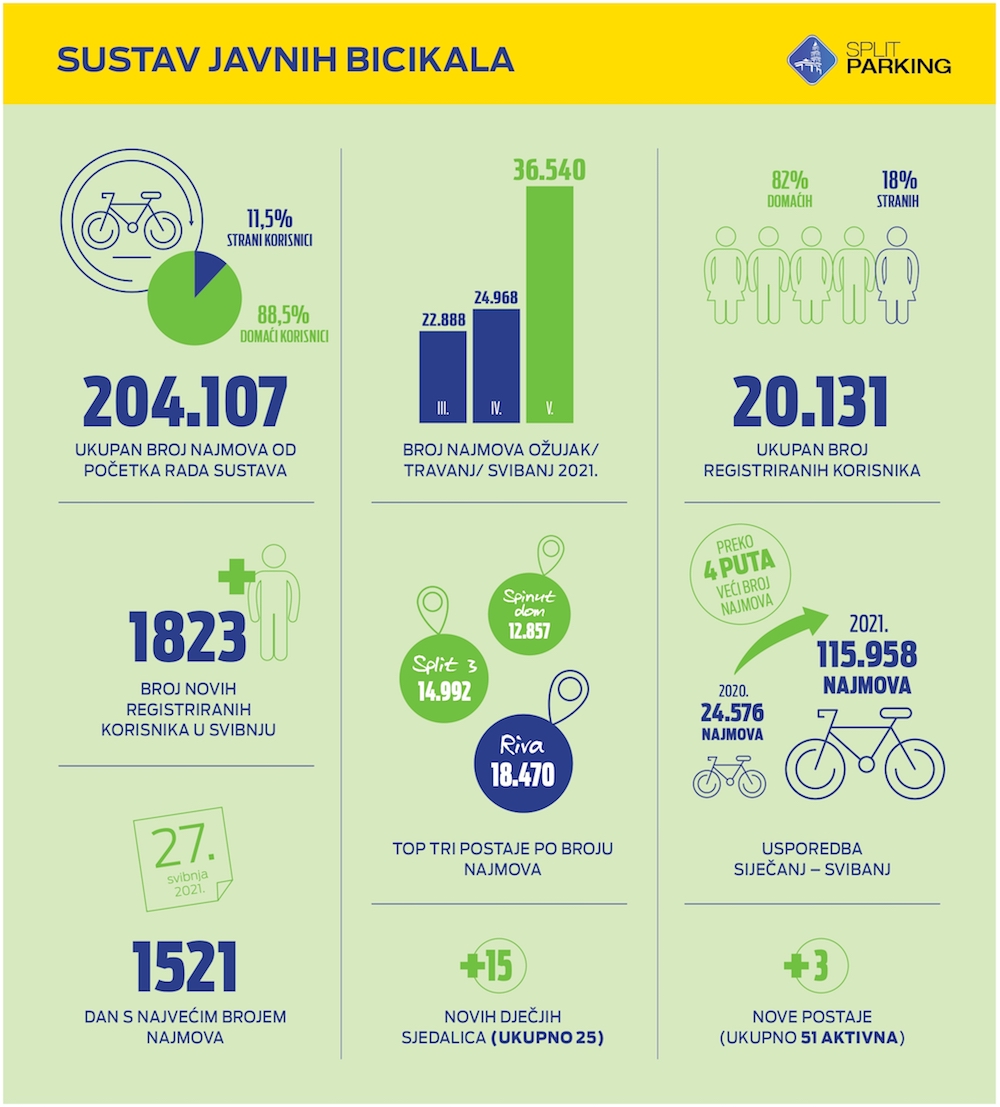
"Cycling has become a habit for the people of Split, and bicycles are becoming an increasingly desirable means of transport because they are now easily accessible. With the growing number of cyclists on the city streets, which will grow further with the start of the season, special attention should be paid to their safety and all road users. Last month, therefore, in cooperation with partners, we issued cycling etiquette to educate users on riding a bike safely and the rules to follow. At the same time, we are also working on better protection of stations and bicycles to prevent damage and make bicycles more accessible to users and less to be repaired. To continue to develop the system of public bicycles in Split and further, it is necessary to work in parallel on the development of adequate infrastructure that will be able to support the growing trend of cycling in Split," said Marko Bartulić, director of Split Parking.
All planned stations have been set up, and a total of 51 stations are available to citizens. After Mertojak, the stations at the elementary schools Žnjan - Pazdigrad, Sirobuja, and the elementary school Kamen Šine were put into operation this weekend. As of this week, parents with children have an additional 15 child seats available.
Split Parking once again invites all citizens to ride a bike responsibly and to find out about the rules for safe riding at: https://www.splitparking.hr/javne-bicikle
For more, follow our lifestyle section.
Croatian Company Podravka Building 12 Million Kuna Solar Power Plant
June the 3rd, 2021 - The Croatian company Podravka is busy with plans to construct a solar power plant on three of its factories, investing a massive 12 million kuna in this environmentally conscious project.
As Poslovni Dnevnik/Suzana Varosanec writes, with the new project for the construction of a solar power plant with a capacity of 2.4 MW, with a total value of 11.7 million kuna, the Croatian company Podravka is joining the increasingly rapid global trend of using renewable energy sources, and all with the intention of intensifying this type of project in the future as well.
This praiseworthy move indicates this much loved company's intention to put the roofs of the remaining factories; Belupo and their logistics capacities, into the function of business savings in the foreseeable future. As a socially responsible company, Podravka clearly plans to further contribute to the wider community by kickstarting a number of projects with environmental benefits.
These premises are already considering the necessary financial estimates for the next two phases in which this truly ambitious goal would be reached - 9.9 MW of RES power.
In the first phase, the RES will produce electricity for its own consumption for all three of the Croatian company Podravka's factories in the Danica Industrial Zone in Koprivnica: the Baby Food and Cream Spreads factory, the Soup and Vegeta Factory, and the Danica factory - which is primarily a sausage factory.
The expected return on this investment is currently three and a half years, while the construction of the "Podravka - Danica" solar power plant, with a power of photovoltaic modules of 3,059.76 kWp, otherwise one of the largest in the Republic of Croatia, will cost 10.3 million kuna. A handsome 5.1 million kuna has been approved for this part of the project, with co-financing from both the European Union (EU) and the Republic of Croatia from the Rural Development Programme.
The Ministry of Agriculture also awarded a non-refundable amount based on the Croatian company Podravka's application for the tender for the implementation of Submeasure 4.2. Support for investments in processing, marketing and/or the development of agricultural products.
The remaining amount of the project, standing at a not so small 1.4 million kuna, refers to the construction of a substation through which the solar power plant will be connected to HEP's electricity network, and that is and will remain fully financed by Podravka alone.
The expected annual production of this power plant is 3.2 MWh, and, as the Croatian company Podravka reports, its commissioning will lead to significant savings in the cost of electricity from conventional sources for the needs of the enterprise's busy factories, but also to a positive impact on the environment by reducing harmful excess CO2 emissions.
For more, make sure to follow our dedicated business section.
Croatian Food Outlet Zabac Opens First Megastore
June the 3rd, 2021 - The well known Croatian food outlet Zabac has opened its very first megastore in the City of Zagreb as the brand's popularity continues to increase.
As Poslovni Dnevnik/Sergej Novosel Vuckovic writes, less than one year after the opening of the last and then largest branch (July the 1st, 2020 in Travno, covering 400 square metres), the only Croatian food chain at outlet prices, Zabac Food Outlet, has opened its seventh and largest store in the Croatian capital of Zagreb.
Across from the Dubec tram turnaround in Dubrava, the Croatian food outlet Zabac (Mega Zabac Food Outlet) covering an area of about 600 square metres in total, started officially operating. It is this company's first megastore, offering more than 1000 items in three categories - rock, stock and breakage, at prices often drastically reduced by as much as 90 percent.
It's worth noting that these are products from both Croatian and foreign brands that are either getting close to their expiration date, became surplus during production, or were those that became damaged when in the factory. The range offered by the Croatian food outlet Zabac changes almost daily, depending on stock availability and arrival from factories.
"The most popular are sweets, snacks and cured meat products," stated the owner of Zabac, Mario Zamboki, when asked about the most sought-after items in his food outlets.
In the Croatian food outlet Zabac located in Dubrava, twenty people found a job (reaching a total of 80 employees across seven of the country's stores), including two girls with special needs, who will fill bottles with popular Labud detergent, soap or fabric softener, for a detergent machine that only exists in Zabac.
Zamboki can freely state that he can't complain about the way in which business is going, but he still points out one thing: "We're solid in life, but a lot of us are hampered when everything is closed down," he stated, insisting that Zabac will not open on Sundays, in other words he supports banning the work of shops on that day, which has been a controversial topic for some time now.
At the Euromonitor 2018 competition, the Croatian food outlet Zabac won the award for innovation in the food category, for a new concept in retail, right behind the Chinese and global giant, the online Alibaba store.
For more, make sure to follow our dedicated business section.
Fancy Breathing in Adriatic Sea Air Under That Mask? Here's How
June the 3rd, 2021 - Fancy breathing in the beautiful aroma of fresh Adriatic sea air when putting that irritating mask back over your mouth and nose yet again as you enter the shop? Now you can, thanks to one Croatian brand and one 100% Croatian protective mask.
As Poslovni Dnevnik/Marta Duic writes, Salt and checkers is a young Croatian company whose team of enthusiasts and medical experts has designed an innovative product: a mask with the addition of no less than sea salt.
"Breathe the sea air" is a mask produced right here in the Republic of Croatia with the aim for everyone to get ''a taste'' of what it's like to breathe the fresh salty air from the beautiful Croatian Adriatic sea.
"The business idea itself was born six years ago. Encouraged by solving our own health problems and challenges, we designed an innovative product that at that time offered a solution to the problem we were facing. We wanted to make the benefits of breathing salty Adriatic sea air available to everyone.
We're especially proud of the fact that we managed to develop and produce a 100 percent Croatian product. The idea was born out of a personal need when a doctor advised a person close to use to stay by the sea for a long time due to the respiratory problems they were experiencing.
This spurred our research and thought about the impact of breathing in salty air on our health which led us to salt rooms and finally to the idea of creating a “portable salt room,” they explained from the Croatian company Salt and checkers. As they noted, during its development, the product has changed many times, in regard to both faces and technical solutions.
The Breathe Sea Air mask which allows users to breath in fresh Adriatic sea air was launched on the market in early 2021, it contains salt that is woven between the layers in order to better preserve its properties and to make its effects last longer. The mask is four-layered and designed to make inhaling and exhaling easier.
"In this long process, we encountered many closed doors and insurmountable challenges, but we also gradually found a group of broad-minded and persistent people who pushed the boundaries a bit and contributed to today's product being complete and people using it with pleasure.
Of course, the coronavirus pandemic had a massive impact on our business, but our idea arose before the pandemic did and the strategies and goals we set were not dependent on the pandemic itself. Our creative team is working on expanding the range and we expect the release of new products at the beginning of next year. We are in love with pure Croatian salt, so we're announcing that new products will also have this connection too,'' they revealed from Salt and checker.
For now, these ''salty'' masks are available on their webshop and in pharmacies all over Croatia, and the entire production process takes place right here in the country.
''We've established a partnership with the company Sophy from Osijek, which is our exclusive manufacturer. We're especially glad about that because we managed to connect blue and green Croatia. It's a renowned and stable partner who, with high expertise and standards, has shown flexibility and production capacity,'' they pointed out from this Zagreb company.
They note that customers immediately understood the product and what it is about and this gives them more of a spring in their step for further entrepreneurial ventures and ideas.
"The first reactions are extremely positive and we're very happy about that. At this early stage of product introduction, we're really listening to literally every reaction, evaluating everything and using the information obtained to make our product even better. Most products are now sold in Croatia, while a smaller part goes to EU countries.
Part of our expansion plans relate to foreign markets and we put a lot of effort into that. If 2021 was the year of the introduction of the Breathe Sea Air mask on the Croatian market, we hope that 2022 will be the year of foreign markets when we will see the results of today's work and investments,'' they concluded.
For more, follow Made in Croatia.
Darko Pervan to Purchase Croatian Spacva, Planning Huge Investment
June the 3rd, 2021 - Darko Pervan, who is a Swedish-Croatian investor quite well known across the country for his business moves and various acquisitions, will be the one to take over the Croatian Spacva company.
As Novac/Jozo Vrdoljak writes, Quaestus Private Equity sold 75.8 of its shares of the Croatian Spacva to Swedish-Croatian investor Darko Pervan and his Croatian company Pervanovo, and the plans now are quite ambitious indeed.
Until recently, the Polish flooring manufacturer Barlinek was the most serious investor in the Croatian Spacva company. But after that enterprise gave up on the venture, Darko Pervan's Pervanovo came into play. Representatives of the Quaestus Private Equity Kapital II fund were in Sweden about a year or so ago and talked personally to Darko Pervan, who is considered one of the most desirable investors in the wood industry, but Pervan kept things close to his chest all the time.
Now it can be seen that Pervan's move was indeed a brilliant strategic move, and the lion's share of the takeover was done by Stjepan Vojnic.
''The process of finding a strategic investor for the Croatian Spacva company began back in September 2020, at during very challenging times given the epidemiological situation.
During the process, talks were held with the largest and most reputable European wood industries and several investment funds. The entire wood industry has operated very successfully since last summer and with surprisingly good results given the situation, but uncertainty and limitations in normal business and travel have made it much more difficult to implement the process that was led entirely by Quaestus.
In the second step of the process, interested investors conducted an in-depth survey of the Croatian Spacva company. Corporate governance and transparent operations have been the focus of Quaestus and Spacva since the very first day of the takeover, and an in-depth look was only a formal confirmation of many years of good practice. The transaction was finalised during the month of May and a transition period will now follow until the assembly is held.
We're pleased with the outcome because satisfactory conditions have been achieved for our investors, but the long-term future of Spacva has also been ensured. As such, both goals of the funds for economic cooperation have been met. The Croatian Spacva company is in an extremely good financial situation with fully organised business processes, and Darko Pervan and the companies in the Bjelin Group have all the necessary resources, knowledge and vision to turn Spacva from a mere Croatian leader to a European leader in the wood industry,'' said Mario Popic from Quaestus Private Equity.
Quaestus otherwise initially took over Spacva back in 2013, after it had fallen into a severe crisis.
An investment of 200 million euros
Stjepan Vojnic, the director of the companies Pervanovo and Bjelin, recently revealed that in this cycle, the companies owned by Darko Pervan headquartered here in Croatia intend to invest 200 million euros. Bjelin, Pervan's second company operating in Croatia, manages plants for the production of floor coverings in Bjelovar and Ogulin, and he's been the owner of the company Furnir from Otok for over two years now.
In addition to the strength of the brand and its implied tradition, the huge value of the company and its contract with Croatian Forests (Hrvatske sume) is also of significance. A quota of 45,000 cubic metres of oak per year for a period of one decade has been agreed.
The Croatian Spacva company's geostrategic position is also valuable due to the fact that the area of Vinkovci still has a sufficient number of interested workers trained to work in the wood industry in this country. During the first quarter of 2021, Spacva recorded 65 million kuna in revenue and 3.4 million kuna in profit, and its inventories were worth a massive 81 million kuna as of March the 31st.
For more, follow our business section.
Friends of Croatia: Diplomatic Immunity
June 3, 2021 - The seventh article in the series, Friends of Croatia: Diplomatic Immunity brings you more details on diplomatic immunity, its boundaries, and examples of exceptions in accordance with the International Vienna Convention on Diplomatic Relations. Details on how the sentry Ministry of Foreign and European Affairs, are included too.
Being a diplomat isn't bad at all. You get to travel and explore the country you are assigned to, experience the new culture while promoting your own. Additionally, you work on improving bilateral relationships and contributing to the dynamic of the geopolitical scene (hopefully for the better).
Earlier in the series, there was an article dedicated to the key terms of diplomacy. But, there is one more thing that is worth giving special attention to: diplomatic immunity.
You probably might be thinking that means exemption from legal prosecution, and you are kinda right. But that doesn't just mean you can just do whatever you want, and law-abiding behavior is, of course, one of the needed characteristics to fit the job description.
In fact, the International Vienna Convention on Diplomatic Relations from 1961 has very clear instructions.
„The person of a diplomatic agent shall be inviolable. He shall not be liable to any form of arrest or detention. The receiving State (a State in which the diplomat is based) shall treat him with due respect and shall take all appropriate steps to prevent any attack on his person, freedom or dignity“, says article 29 of the Vienna convention. Its also worth adding that the same protection applies for his/her private residence, as well as papers and correspondence, and the diplomatic agent is also not obliged to give evidence as a witness.
But, for not everything to be all benefits and no responsibilities, article 31, despite repeating that „ a diplomatic agent shall enjoy immunity from the criminal jurisdiction of the receiving State and that diplomatic agent „shall also enjoy immunity from its civil and administrative jurisdiction“ – he lists exception. Such as in the event of a real action relating to private immovable property situated in the territory of the receiving State, (unless he holds it on behalf of the sending State for the purposes of the mission) or in the case of an action relating to succession in which the diplomatic agent is involved as executor, administrator, heir or legatee as a private person and not on behalf of the sending State and finally, in the event of an action relating to any professional or commercial activity exercised by the diplomatic agent in the receiving State outside his official functions.
Additionally, „the immunity of a diplomatic agent from the jurisdiction of the receiving State does not exempt him from the jurisdiction of the sending State“.
Ministry at your (diplomatic) service
With the Croatian Ministry of Foreign and European Affairs already stating for this series that they take diplomatic relations very seriously, they respect the convention, and their Diplomatic Protocol Office is here to help. As evident in their protocolar guide, they have an entire section dedicated to privilege and immunity.
„Diplomatic missions and international organizations accredited in the Republic of Croatia notify the Ministry of Foreign and European Affairs, to the Diplomatic protocol arrival of the (diplomatic) mission, attaching the diplomatic note, and the copy of the passport that will be notified“, states the guide in respects to the International Vienna Convention on Diplomatic Relations. The guide adds that when stepping on duty, the Diplomatic protocol will have a view in the passport of a notified person, and it will place a stamp with the following content that will confirm the passport was reviewed by the Ministry. Along with the date and signature to match. This leads to issuing a special identity card that then allows entering the Republic of Croatia without a visa.
„The special ID is issued to the members of missions and consulate offices, members of the UN organizations, and other specialized UN institutions, members of international organizations accredited in the Republic of Croatia, as well as members of their families or members of the shared household and members of private service“, elaborated the guide.
With the aforementioned documents, to get the ID, diplomats must also provide their photos and fill in a questionnaire which can be downloaded from the guide.
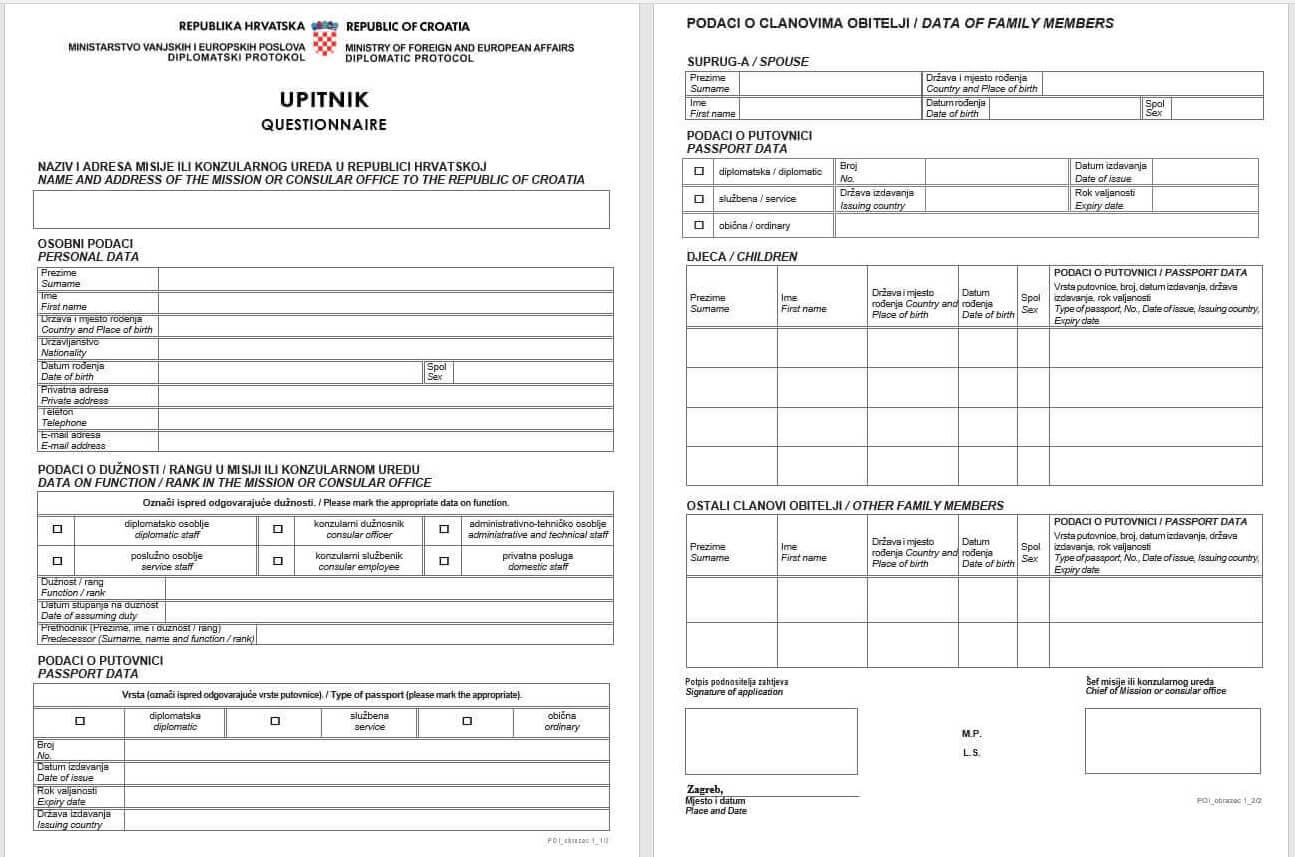
Diplomatic protocol questionnaire/screenshot, Total Croatia News
To read more from the series "Friends of Croatia", follow TCN's dedicated page.
For more about diplomacy in Croatia, follow TCN's dedicated page.
KK Split Sensationally Stops another Zadar Match-point to Tie the Series
June 2, 2021 - 81:68 (44:37) KK Split victory sends the national finals into a decisive game 5 in Zadar on Friday.
Zadar had already celebrated with its fans from the balcony of Krešimir Ćosić Sports Center after the win on Friday to take a 2:0 lead in the series. Then at the game on Monday, the guests were already 16 points ahead in the second quarter and looked like the next champions. Now it looks like they celebrated too early. After tonight's defeat, Zadar will have a home-court advantage, but the Yellows now have the momentum on their side.
Split showed a remarkable reaction already during the last game. After a dunk from the Yellows' big man Luka Babić, Zadar had to take a timeout. On the way to the bench, Marko Luković from Split and Aleksandar Bursać from Zadar got into a verbal dispute that caused the teams to go head to head on the court and home coach Mile Karakaš had to wrestle Luković to the ground to save him from further disciplinary punishment. Both players were ejected and it became a turning point in the series. Zadar seemed to have lost all energy while Split started to dominate the game and managed to cut the lead by end of regular time and then easily won the game in overtime.
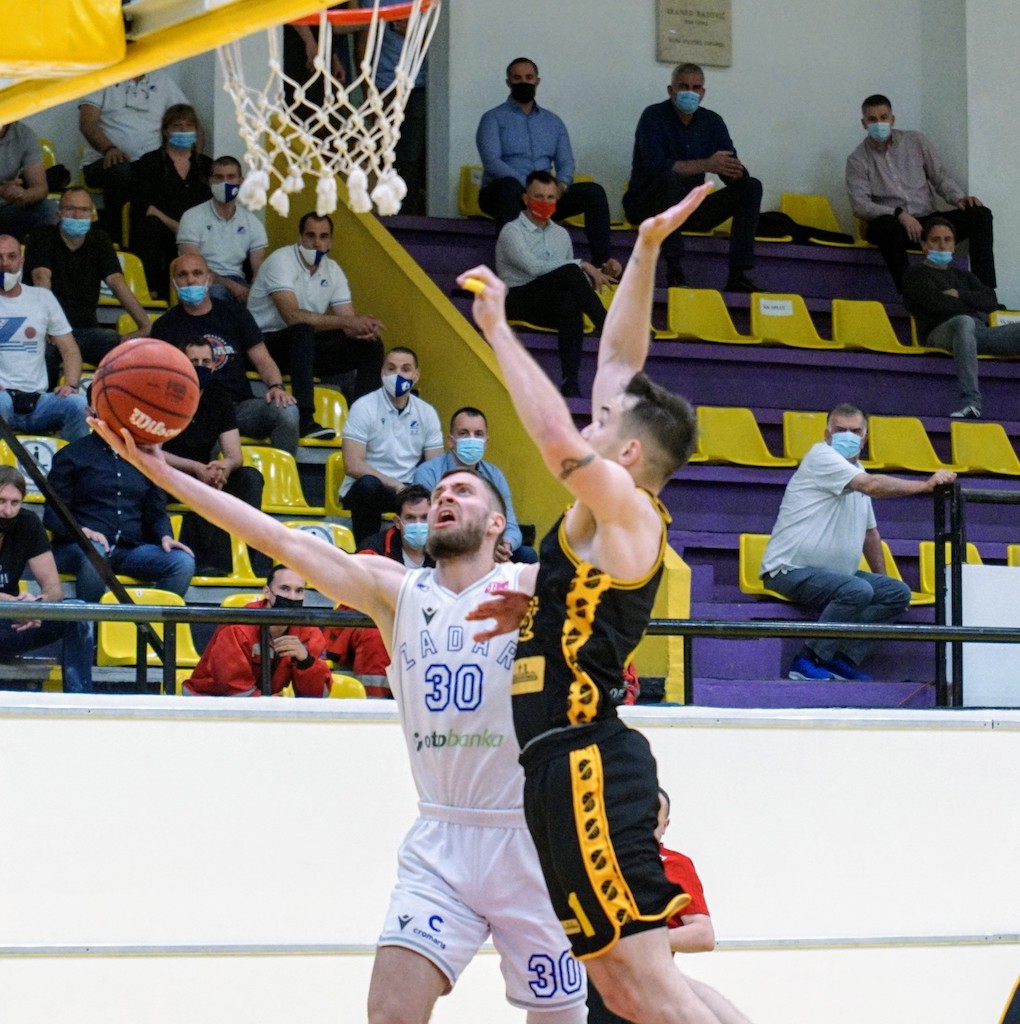
Burak Canboy
Both "fighters" were allowed to play again today and the game started with both teams playing on the same level. Changing leads with good outside scoring was the predominant situation in the first minutes before Zadar was able to pull away 14:21 after 9 minutes and close the quarter at 19:23.
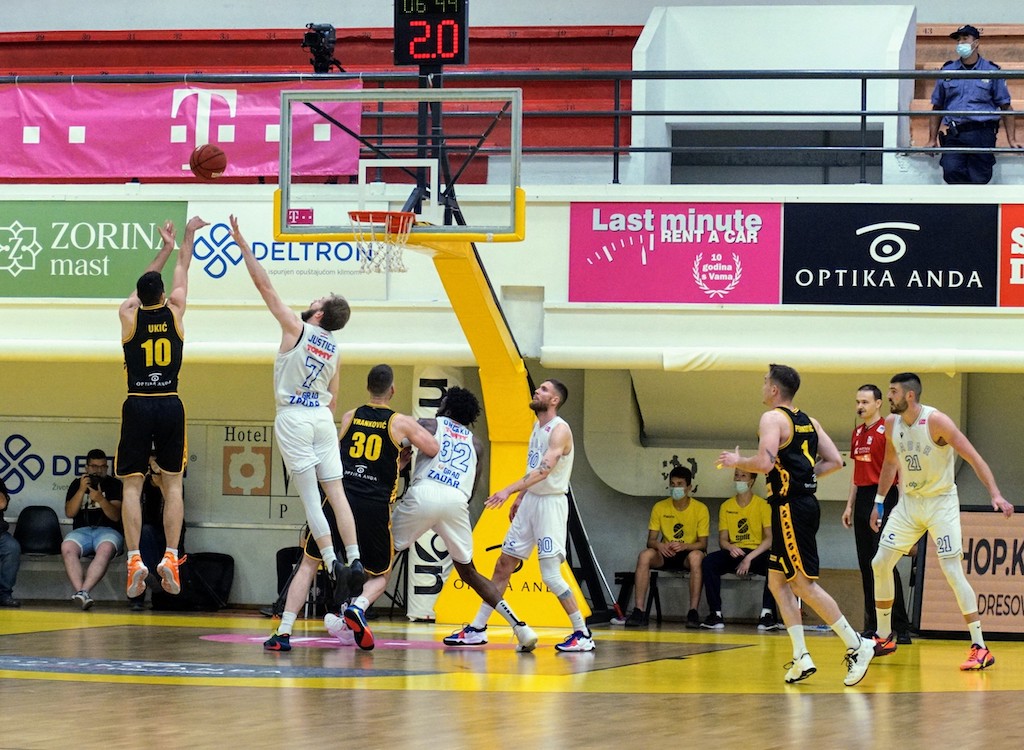
Burak Canboy
The guests managed to lead until Split came back with a double punch. A three-pointer by Toni Perković marked the 25:27 in the 13th minute before another three-pointer by Perasović gave the Yellows a 28:27 lead.
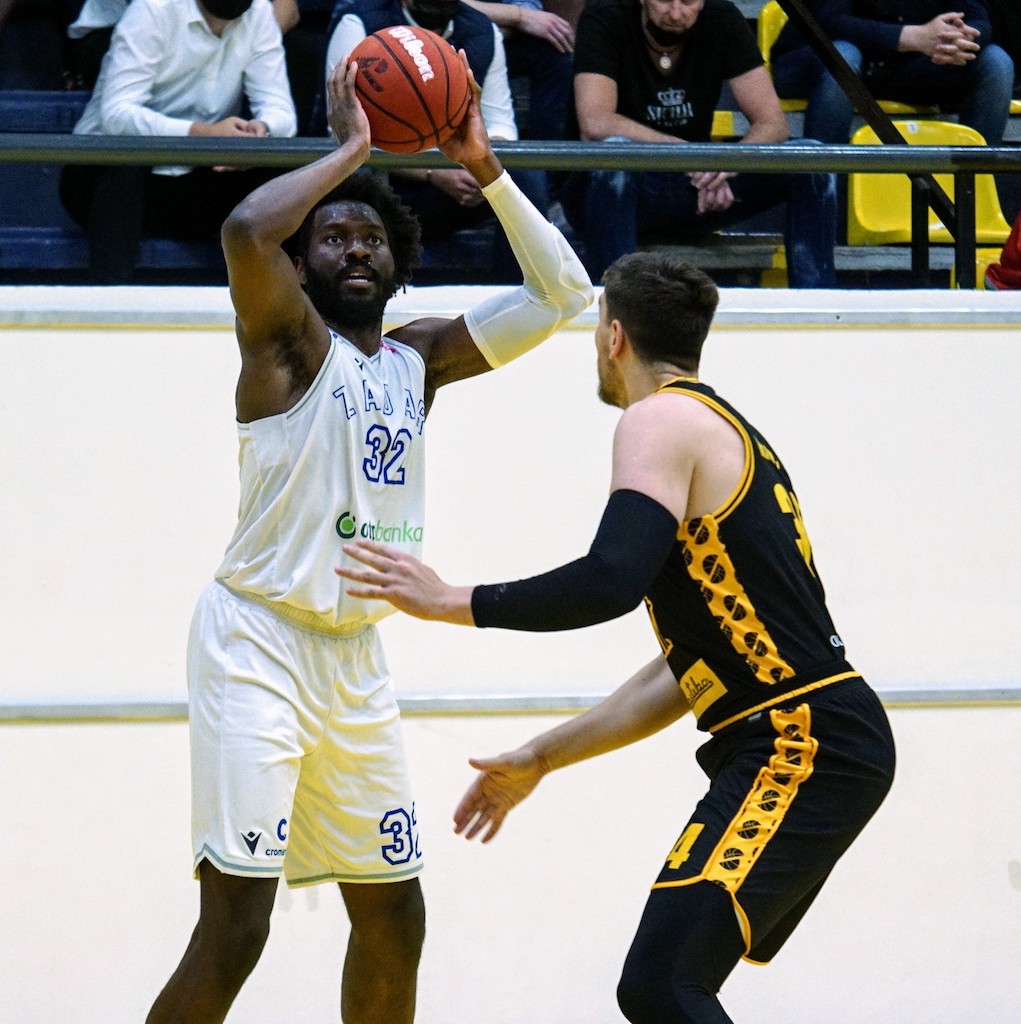
Burak Canboy
KK Zadar fought back and both teams were exchanging leads before Perković marked the 33:31 and Split managed to have a run to reach its biggest lead of the first half at 44:36 just before half-time (44:37).
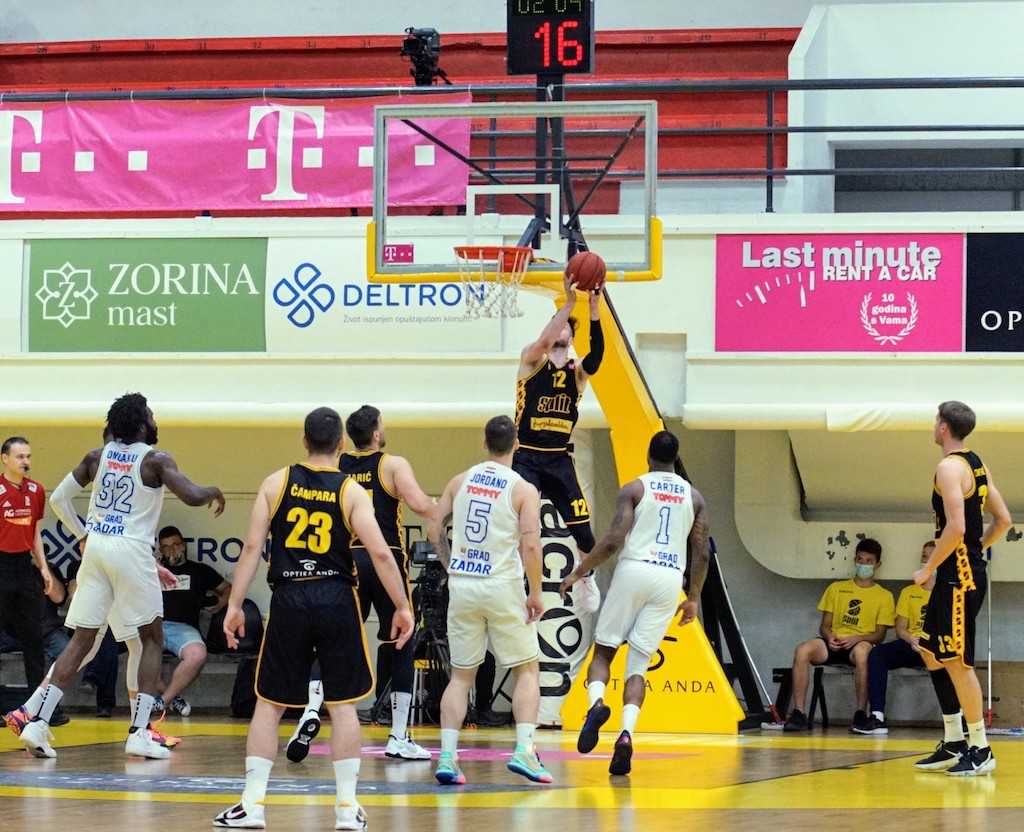
Burak Canboy
The second half started with both teams respecting one another and none wanting to lose ground. There was a long time without scoring before Marko Luković showed the positive side of his game by hitting 2 back-to-back three-pointers to give the hosts a 56:42 lead who managed to maintain the lead until 62:48 at the end of the third quarter.
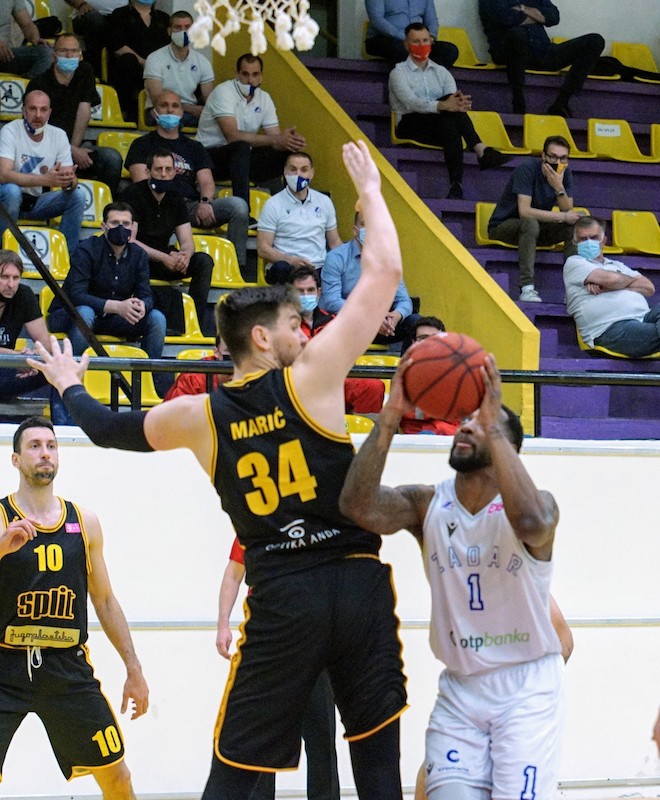
Burak Canboy
Zadar could not come back and Split managed to use its homecourt advantage for the second time and now has a shot at the title again on Friday when the decisive game at Krešimir Ćosić Sports Center will produce the 2020/2021 Croatian National Basketball Champions.
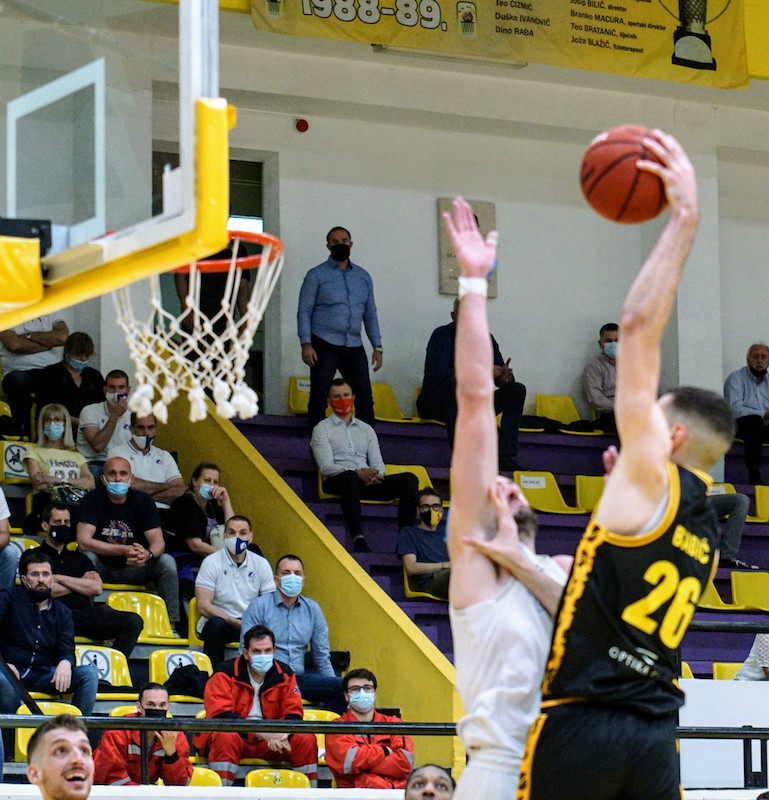
Burak Canboy
The best players of the night were Toni Perković with 18 points (4/8 three-pointers) and Marko Luković 17 points (5/8 three-pointers). Mavra, Onuaku, and Carter were able to score double digits for the guests.
Referees: Tomislav Vovk, Alfred Jovovich, Bojan Kruljac
Boxscore: https://fibalivestats.dcd.shared.geniussports.com/u/HKS/1884521/
To follow the latest sports news in Croatia, follow TCN's dedicated page.
To learn more about sport in Croatia, CLICK HERE.


